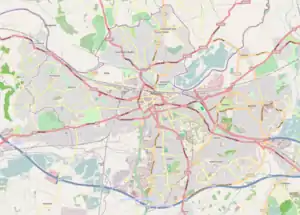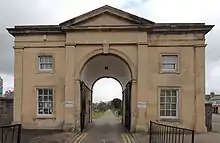Reading Old Cemetery
Reading Old Cemetery (originally Reading Cemetery) is in the east of Reading, Berkshire, England. It is located immediately to the east of Cemetery Junction, a major road junction in Reading. The cemetery is Grade II listed.[2]
 Section of Reading Old Cemetery | |
 Location within Reading | |
| Details | |
|---|---|
| Established | 1842 |
| Location | |
| Coordinates | 51.4532°N 0.9459°W[1] |
| Size | 11.5 acres (47,000 m2) |
| No. of graves | 18,327 |
History

Reading Cemetery was set up by a private act of Parliament in 1842, establishing the Reading Cemetery Company. The first interment took place in 1843.[2] It was one of many cemeteries built in the Victorian era in response to the rapid population increase in the 19th century.
Reading Cemetery was built on farm land outside the existing borough boundaries at a site called Hattons Platt which was owned by a Mr. Cholmeley. Few people wanted their family buried in the new cemetery until the 1850s, by which time the situation had become so bad that the three cemeteries in the centre of Reading were closed.

The cemetery itself, and within it the entrance lodges and the Sarcophagus Monument, are all Grade II listed buildings.[3][4][5]
Chapels
The cemetery originally included two chapels, one for Anglicans and one for so-called Dissenters who refused to support Anglican rites. Burials were also divided between the Anglican consecrated ground and the Dissenters' non-consecrated ground and a small wall marked the boundary between the two.
Extension
The cemetery was extended at its far end in the early 20th century and taken over by Reading Borough Council in 1959. Occasional burials still take place there in plots purchased by families years ago. There are 18,327 grave spaces covering 11.5 acres (47,000 m2).
Memorials

The cemetery contains the graves of most of the historically noteworthy occupants of the town during the period 1843–1970. The site is of great local historical interest with many large memorials, two of which are Grade II listed. The two listed memorials are the memorial to Bernard Laurence Hieatt, and others, occupies a plot at the eastern end. The memorial stands head and shoulders over most except the adjacent cross; and the cast-iron urns on the site of the Dissenters chapel. The westernmost urn is dedicated to members of the Andrewes family and the easternmost urn to members of the Barratt family. This paved area is at present obscured by a huddling Beech tree.
The cemetery contains the war graves of 205 Commonwealth service personnel of World War I (besides one Serbian serviceman of the same war) and 41 of World War II. There is a large war graves plot in the back of the cemetery, in the right hand corner from the entrance, where stands a Screen Wall memorial to those buried in Plot 72 and elsewhere in the cemetery whose graves could not be marked by headstones.[6] Many other memorials are in the cemetery including three Old Contemptibles who served in the British Expeditionary Force and survived the Great War:
- Lance Corporal William Marshall MM, 2nd Royal Berkshire Regiment
- Captain Philip Knightley, RAMC, died 9 April 1965
- 2nd Lieutenant Ernest William Ellis, 5th Royal Berkshire Regiment
Other notable memorials are for George Blackall Simonds, sculptor of the Maiwand Lion in Forbury Gardens; Joseph Edward Sydenham, the founder of Reading F.C. who died in 1913, and that of William "Willie" Wimmera, an Aboriginal Australian boy who died in 1852, aged 11, from tuberculosis and peritonitis after missionaries brought him to Reading.[2]
Maintenance
Reading Borough Council maintains the cemetery on a conservation basis. The grass is cut, by strimmer, on four occasions per year and is raked off only if excess growth makes it necessary. The Council also carry out interments in existing graves, there being no new graves available on this site. These burials, including those of cremated remains, are currently in single figures per year. Several Muntjac Deer live in the cemetery grounds.[7]
References
- OS 1:25 Provisional Edition
- Discover gems of our heritage Archived 7 March 2012 at the Wayback Machine, Reading Chronicle, 10 September 2009.
- Historic England. "Reading Cemetery (Grade II) (1001641)". National Heritage List for England. Retrieved 28 December 2018.
- Historic England. "Entrance Lodges and Gates to Cemetery (Grade II) (1113512)". National Heritage List for England. Retrieved 28 December 2018.
- Historic England. "Sarcophagus Monument at Reading Cemetery (Grade II) (1096057)". National Heritage List for England. Retrieved 28 December 2018.
- CWGC: Reading Cemetery
- "GC2VCZN Reading Old Cemetery (Traditional Cache) in Southern England, United Kingdom created by Copper & Tin". Geocaching.com. Retrieved 3 December 2012.
Further reading
- Allen, J. R. L. (2018). "Reading's Old or East Cemetery: the geological landscape of an urban burial ground in modern central Berkshire". Landscape History. 39 (1): 71–86.
External links
| Wikimedia Commons has media related to Reading Old Cemetery. |
